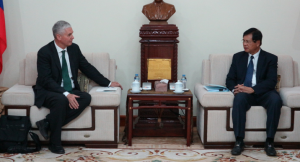
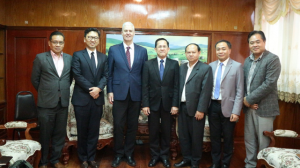
On the occasion of GGGI Director-General, Dr. Frank Rijsberman’s visit to Lao PDR on February 19, the Government of Lao PDR and GGGI took the opportunity to announce Lao PDR’s membership and discuss the opportunities for promoting green growth in Lao PDR.
In recent years, economic growth in Lao PDR has averaged around 7 percent per year. While this growth has helped Lao PDR progress towards the goal of graduating from Least Developed Country status, continued growth will largely depend upon the country’s ability to make more efficient use of its natural resources, diversify its economy to add new engines of growth, and ensure all of its citizens enjoy the benefits of growth and development.
Most of the meetings focused on – how to translate the principle of green growth and sustainable development into action. There were discussions on how to set up the right enabling environment and create conducive policies and institutional arrangements that can help to facilitate good public and private investments in a range of key sectors.
His Excellency, Dr. Souphan Keomixay, Minister of Planning and Investment emphasized the importance of creating the right policies and incentives for attracting private sector investment in Lao PDR’s green growth priorities.
Lao PDR is currently formulating its national green growth strategy and aims to complete it by the end of 2018. GGGI shared some of its experiences and lessons learned from the pursuit of green growth in other countries as Lao PDR determines its own way forward.
Last October, Lao PDR officially became the 28th Member of the Global Green Growth Institute (GGGI).
In the press conference announcing Lao PDR’s membership to GGGI, Dr. Kikeo Chanthabouly, Vice Minister of Planning and Investment, stressed the importance of learning lessons from past experiences as Lao PDR looks towards to the future. He also highlighted the importance of inclusive growth for the country, ensuring no one is left behind.
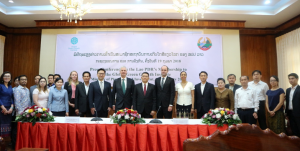
While there are still many challenges ahead in the transition towards green growth for Lao PDR, the commitment to green growth articulated in the 2030 vision and 2025 strategy and current development plan puts Lao PDR in a good position. The forthcoming green growth strategy can help to chart the path forward. GGGI looks forward to continued collaboration to realize the green growth potential of Lao PDR and welcomes Lao PDR to our community of countries dedicated to supporting and promoting strong, inclusive and sustainable economic growth.
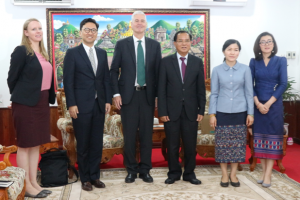
His Excellency, Mr. Bousone Boupphavanh, President of the National Institute of Economic Research, highlighted the Government’s plans to develop the Bolaven Plateau and the Southern provinces. An important environmental area with 15 rivers, where 47% of land is protected forest and agriculture plays a vital role in the economy. They plan to improve rural livelihoods, create new green, sustainable towns, support organic agriculture and food production, and develop tourism and leisure activities that take advantage of the region’s natural beauty and historic importance.
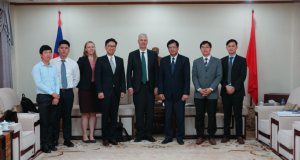
Lao PDR was the first ASEAN country to submit its National Determined Contribution (NDC) and ratify the Paris Agreement. So when we met with the Minister of Natural Resources and Environment, H.E. Mr. Sommad Pholsena we shared GGGI’s experiences assisting Thailand, Fiji, and Ethiopia to develop plans to implement their NDCs and agreed to work together to support Lao PDRs climate change objectives.
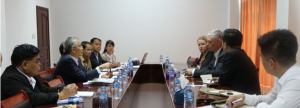
Lao PDR remains one of the least densely populated countries in the world, however, the country is experiencing rapid urban population growth and urban expansion leading the region in these two areas according to a 2015 World Bank report on urban development in East Asia. Urbanization, increased consumption, and competition over natural resources and the services they have historically provided poses new challenges for urban development in Lao PDR. So when we met with the Ministry of Public Works and Transport we discussed creating new systems, services and markets to prevent the worst effects of pollution and poor sanitation and provide opportunities for more sustainable and equitable growth. Transportation and mobility and wastewater management where top of the agenda in our discussions with H.E. Dr. Santisouk Simmalavong.